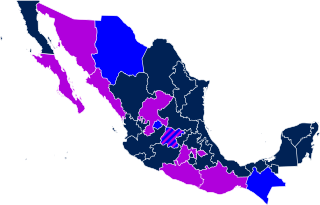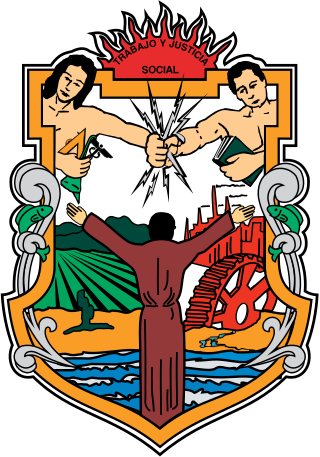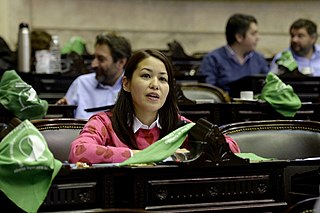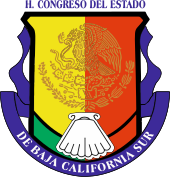
The United Mexican States is a federal republic composed of 32 federal entities: 31 states and Mexico City, an autonomous entity. According to the Constitution of 1917, the states of the federation are free and sovereign in all matters concerning their internal affairs. Each state has its own congress and constitution.

The Congress of Deputies is the lower house of the Cortes Generales, Spain's legislative branch, the upper house being the Senate. The Congress meets in the Palace of the Parliament in Madrid.

The Congress of the Union, formally known as the General Congress of the United Mexican States, is the legislature of the federal government of Mexico consisting of two chambers: the Senate of the Republic and the Chamber of Deputies. Its 628 members meet in Mexico City.

The Congress of the Republic of Peru is the unicameral body that assumes legislative power in Peru. Due to broadly interpreted impeachment wording in the Constitution of Peru, the President of Peru can be removed by Congress without cause, effectively making the legislature more powerful than the executive branch. Following a ruling in February 2023 by the Constitutional Court of Peru, the body tasked with interpreting the Constitution of Peru and whose members are directly chosen by Congress, judicial oversight of the legislative body was also removed by the court, essentially giving Congress absolute control of Peru's government. Since the 2021 Peruvian general election, right wing parties held a majority in the legislature. The largest represented leftist party in Congress, Free Peru, has subsequently aligned itself with conservative and Fujimorists parties within Congress due to their institutional power.

The Congress of the State of Jalisco is the legislative branch of the government of the State of Jalisco. It was constituted for the first time after the independence of Mexico on September 8, 1823. Having its first session on September 14 of the same year. The Congress is the governmental deliberative body of Jalisco, which is equal to, and independent of, the executive.

The Congress of the State of Guanajuato is the legislative branch of the government of the State of Guanajuato. The Congress is the governmental deliberative body of Guanajuato, which is equal to, and independent of, the executive.

Same-sex marriage is legally recognized and performed throughout Mexico since 31 December 2022. On 10 August 2010 the Supreme Court of Justice of the Nation ruled that same-sex marriages performed anywhere within Mexico must be recognized by the 31 states without exception, and fundamental spousal rights except for adoption have also applied to same-sex couples across the country.

The Congress of the State of Baja California is the legislative branch of the government of the State of Baja California. The Congress is the governmental deliberative body of Baja California, which is equal to, and independent of, the executive.

The Honorable Congress of the State of Guerrero is the legislative branch of the government of the State of Guerrero. The Congress is the governmental deliberative body of Guerrero, which is equal to, and independent of, the executive.

Víctor Manuel Castro Cosío is a Mexican politician currently affiliated with the National Regeneration Movement. He is the governor of Baja California Sur.
Same-sex marriage has been legal in Baja California Sur since 29 June 2019. On 27 June, the state Congress passed a bill opening marriage to same-sex couples. It was published in the official state gazette on 28 June and took effect the following day, legalizing same-sex marriage in Baja California Sur.
Gil Cueva Tabardillo is a Mexican politician representing the National Action Party (PAN). He served in the XIII Legislature of the Congress of Baja California Sur from 2011 to 2015.
Araceli Niño López is Mexican politician representing the National Action Party (PAN). A doctor by profession, she served in the XIV Legislature of the Congress of Baja California Sur from 2015 to 2018.
The Congress of the State of Durango is the unicameral legislative branch of the government of the Mexican State of Durango. The Congress is the governmental deliberative body of Baja California, which is equal to, and independent of, the executive.

Laura Russo is an Argentine politician who served as a National Deputy from 2017 to 2021. A member of the Justicialist Party, Russo was elected in 2017 in Buenos Aires Province, and formed part of the Frente de Todos bloc from 2019 to 2021.

Karina Verónica Banfi is an Argentine politician, currently serving as National Deputy elected in Buenos Aires Province since 2015. She is a member of the Radical Civic Union (UCR).

The Congress of the State of Tlaxcala is the legislative branch of the government of the State of Tlaxcala. The Congress is the governmental deliberative body of Tlaxcala, which is equal to, and independent of, the executive.
Jerónimo de la Rosa Gómez was a Mexican politician and trade unionist. He served in the V Legislature of the Congress of Baja California Sur from 1987 to 1990 as a member of the Institutional Revolutionary Party (PRI). He also served as the leader of the Confederation of Mexican Workers (CTM) at the state level.

Pilar Cancela Rodríguez is a Spanish politician who has been serving as Secretary of State for International Cooperation in the Spanish Ministry of Foreign Affairs since 2021.














